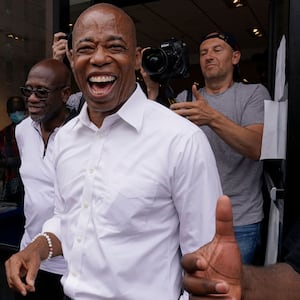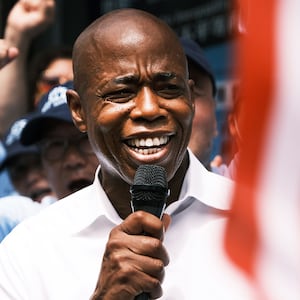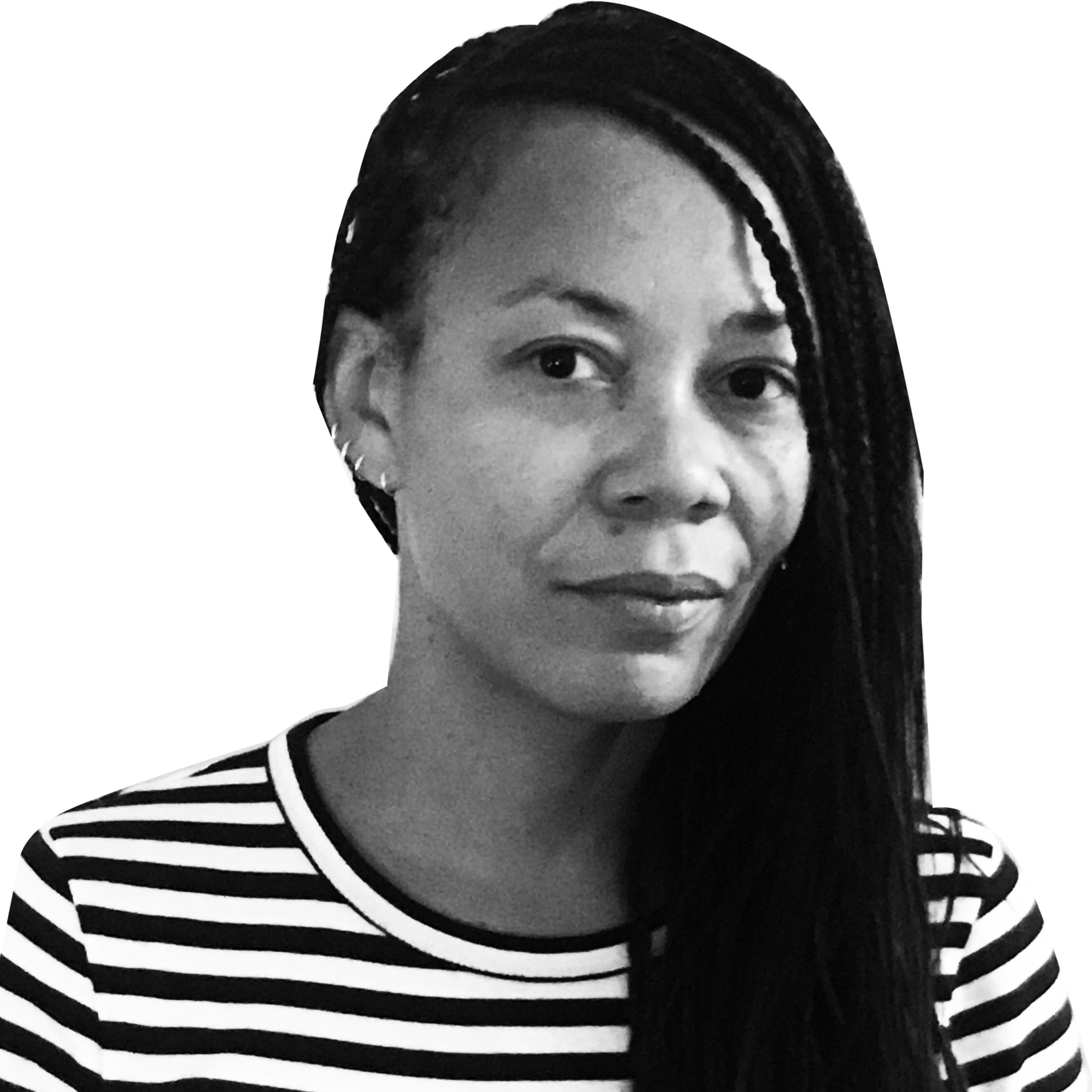There are political candidates who are all boasts and bluster on the campaign trail, who tone things down once they take office.
Not Eric Adams. In the week since he officially became New York City’s mayor, the man who was a police officer for 22 years before going into politics full-time has kept up the same Big Sweaty Cop Energy he displayed during his run.
Adams was sworn in just after the ball dropped on New Year’s Day last weekend, and he immediately proceeded to kick things off by tacitly criticizing the outgoing administration for allowing New York City to be brought low by both COVID and a lack of mayoral “swagger,” a problem he promised to remedy by firmly calling on everyone to return to business as usual in the midst of a global pandemic.
In keeping with a campaign promise, he affirmed that he will be reviving the NYPD’s anti-crime team, a unit which had been disbanded for aggressively over-policing Black and Hispanic neighborhoods, accruing frequent civilian abuse complaints and amassing so many fatalities the NYPD couldn’t fabricate enough justifications. At a press conference during which he stood with his newly appointed NYPD executive team, Adams evinced support for a gang-focused crime crackdown that explicitly promises to send teenagers as young as 15 and 16 years old to prison.
On Thursday, he was joined by Gov. Kathy Hochul in announcing a plan to reach police “omnipresence” on the city’s subways, despite crime levels on public transport being at 25-year lows. On Friday, he announced that his deputy mayor for public safety, overseeing the NYPD, would be Philip Banks, who was an unindicted co-conspirator in a sweeping federal investigation of police and political corruption; named his younger brother Bernard, a retired NYPD sergeant who worked for the last decade as assistant director for parking at Virginia Commonwealth University, as a deputy police commissioner; and saw his newly appointed police commissioner send out a memo to officers blasting the newly elected Manhattan district attorney’s plans for justice reform.
Those moves came after the mayor, in response to an open letter from 29 incoming City Council members—a majority of the city’s legislative branch—rejected their request to walk away from his support for restoring the inhumane practice of solitary confinement. At the same time, he used smoke-and-mirrors cop-speak to insist his support for confining prisoners in isolation—you know, solitary confinement—is “punitive segregation,” something totally different.
“I wore a bulletproof vest for 22 years and protected the people of this city,” Adams huffily stated at the presser, a challenge to anyone who might point out how the policies he endorses have not only failed to ensure public safety but instead been instruments of yet more harm. “When you do that, then you have the right to question me.”
Putting aside the echoes of I alone can fix it in Adams’s statement—what is it with these guys who grew up in Queens?—the mayor was dismissing not only the City Council letter signatories, whom he will have to work with for at least the next two years, but also shush-ing all of his progressive critics. It’s a sign of how Adams will likely govern going forward, at the helm of an administration that is focused on “law-and-order” carceral solutions and corporate-friendly policies.
Adams never hid this agenda, and he won the mayoral race not despite but because of it. A former Republican and ex-NYPD police captain who said he would wear a gun while undertaking mayoral duties, Adams ran as an unapologetic proponent of tough-on-crime measures, once calling himself a “conservative on public safety,” vowing to appoint Criminal Court judges who might challenge bail reform, and voicing support for a redux of stop-and-frisk law enforcement.
Elsewhere, Adams has been Bloombergian in his welcoming of big business, assembling a new “Corporate Council” of advisers from the C-suites of companies including Goldman Sachs, JPMorgan Chase and Pfizer, while making the laughable assertion that his election signals “New York will no longer be anti-business,” as if corporate millionaires and their company shareholders haven’t played an outsized role in shaping contemporary New York City.
Last week, Adams earned justified blowback on social media after erroneously referring to essential workers as “low skilled,” but it seems just as noteworthy that he made that gaffe in the course of arguing that laborers of every stratum should risk getting a potentially fatal respiratory disease to ensure the permanency of capitalism.
Five days in, Adams is continuing with the rhetoric that put him in the mayor’s office and fulfilling the promises he made to a cross section of wealthy donors, working class Black and brown folks wary of both racialized policing and a crime surge overhyped by local and national media, an opportunistic real-estate sector and centrist/moderate elements of this so-called “liberal stronghold.
During a recent television appearance, Adams said, and for not the first time, “I am the face of the Democratic party.” (He has also previously said, “I am real estate also,” but I digress.) That suggests that despite the swells of progressivism in New York City’s political waters in recent years— including that incoming wave of first-term City Council members he rebuffed just days ago—Adams represents the interests of an awful lot of voters in this overwhelmingly Democratic city.
In many disheartening ways, that’s true. There’s a reason it seems fitting that Adams recently dubbed himself the “Biden of Brooklyn,” and that he was able to eke out a win over more progressive Democratic primary contenders led by Maya Wiley.
Having seized that narrow victory, he’s bringing Big Sweaty Cop Energy down on everyone who sees the world differently, including those who have called him out on social media in recent days.
“It’s wrong to keep saying that this is what all New Yorkers are saying just because a numerical minority or the best Twitter handle, the best Instagram, the best Facebook [says it],” Adams declared his first day in office. “That is not what people need.”
It’s gonna be a rough four years, folks, with Adams determined to put progressives into the political equivalent of punitive segregation.
“You can’t be a good shepherd if you are not among the sheep,” Adams recently told media as a way of explaining why he will Citibike and subway his way across the city. It sounds like a vaguely biblical quote, a sort of benevolent stance of a mayor describing how he can best caretake his constituents by moving amongst his flock.
That is, until you consider that earlier this year, he used another bit of sheep imagery—not derived from the Bible but from Game of Thrones—to a group of high schoolers: “All of you are lions and lions don’t care about the opinions of sheep.”
That scans, so far, at least where Adams’ progressive critics are concerned.



